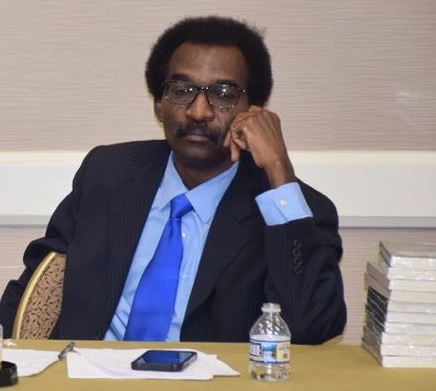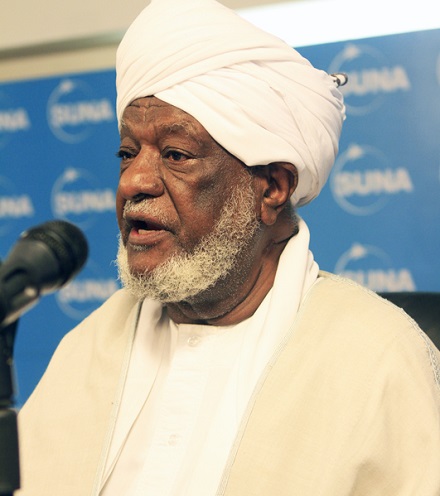How Did the New Media Influence the Sudanese Intellectual and Cultural Productions?
02 September, 2018

RESTON, USA (Sudanow) - Norms are changing rapidly in today’s world.
Every hour brings huge new information that politically, economically and culturally affects the people’s present and future. By the end of the era in which creative products targeting the public domain were censored, the recipient has become, instead, an effective producer of his own media and cultural items.
He/she can write news stories, comments, articles, essays and intellectual studies, and in the meantime disseminate them among his/her target audience. Whether you agree or disagree with the contents presented, the important thing is that freedom of expression has become a weapon citizen uses everywhere in our small planet. Though, this situation is affecting the traditional media, still the greatest benefit is that the media old school can be refurbished to effectively compete with the new one.
These new challenges the traditional journalists and writers are facing call on them to dust out their professional imagination. The good news is that the experienced in the field still can prevail, if they calmly accept facing that vital challenges.
In terms of the question of how it could respond to this new media development, Sudanese society no doubt faces extra challenges. But the most difficult challenge before putting forward any cultural alternatives to what some describe as “the cultural invasion”, is to first face the question of how to achieve National Reconciliation.
Since the Sudanese society is rather politically, religiously and culturally diverse and multi-dimensional, no effort to deal with these new media challenges would prevail.
However, the government is now pressing up to pass a new legislation that intends to curb the new media’s freedom of expression.
Such a severe act will not make a difference but rather expand the existing controversial gaps among, and within the different Sudanese groups.
The Challenges of Religious Norms
Instead of acknowledging their societal necessity, the Association of Sudanese Scholars, based in Khartoum, has sharply criticized social networking sites, describing them as “unchecked journalism” that seeks to score cheap material gains.

Professor

Mohammad Osman Saleh, the head of the institution, sees that the internet sites as carrying poison more than honey. He called for confronting them, pointing out to the negative effects of these sites on the intellectual orientations of the new generation of the “Muslim Ummah”.
Saleh stressed the need to preserve the religious spirit and faith education in the face of what he described as rampant physical and individual tyranny.
Hassan Osman Hasson, a Sudanese blogger, says that in the past five years social networking sites in Sudan have witnessed a significant increase in the number of users, which have contributed to the creation of cultural and political awareness among the young people.
They have also contributed to the success of many initiatives, campaigns and the dissemination of a culture of voluntary work, entrepreneurship. “They have highlighted many writers and bloggers' works”, said Hasson, but, as he emphasizes, “it negatively affected the Sudanese content on the Internet, where we do not find this content distinguished in the search engines or in the specialized platforms...because it is existing only in social networking sites.”
The Minister of Telecommunications and Information Technology in Sudan, Tahani Abdullah Attiah, recently announced the start of work on the renewal of the law on information crimes in 2007, which includes severe penalties for "extortion and abuse" through social networking sites, especially Facebook, WhatsApp, Twitter and others.
Historically, Sudan has experienced authoritarian regimes akin to other third world states, where media outlets come under strict grip and the private sector is denied the right to enter the domain. But at other times the country lived under multi-party regimes, when opportunities were available for independent and partisan journalists to publish their own newspapers.
Threats to Traditional Media Role
Under a new political transformation accompanying the dawn of the new millennium, the Sudanese government has allowed journalists and investors to publish independent newspapers and to launch TV channels. This government process led to the flourish of the free media at the time of implementing the Comprehensive Peace Agreement, signed on January 9, 2005, by the Sudan People's Liberation Movement (SPLM) and the Government of Sudan.
But with the decline of the printing media and the rapid acceleration of the influence of the digital age, the internet and social networking sites have captured the attention of the public domain, leaving no room for the other government-sponsored media institutions to compete.
Further, at a time where the new media is becoming more influential in society, the official and private media organizations are conceding historic grounds. Because of constant official regulatory pressures leveled against them, the Sudanese citizens are veering to the Internet, where they find uncensored news and information.
A new study by Mohammad Hamed and Howaida Azam has indicated that this “electronic culture” has produced new possibilities to teach young people a new culture and caused structural changes in Sudanese society, especially in the social fabric.
The study pointed out that this culture produced some transformations in the religious, political and social patterns and created different types of generations, which constitutes “a menace” to the general values and brings negative effects to the Sudanese traditions.
According to the study, Sudan ranks number two in telephone-spurred Internet usage in Africa, explaining that Internet café areas have become some of the most attractive venues for young people.
The study said that the Internet usage is behind many emotional problems for young people and contributed to changing the way of living of the Sudanese family.
A Mechanism of Change

“The new media is inevitably going to improve the freedom of expression and change the consumption behavior and empower youth and women to play a major role in the political field,” said Abdelgader Yousif, a Sudanese journalist lives in America. He asserted that “people in the third world will start to ask about the reasons preventing them from adopting that political system which is going to lead them to progress, development, peace and stability and how they become part of the progressive world."
Abdulgadir, also, sees that the new media has become a mechanism of
change impacting the social, economic and political life of the ordinary people and push them to compare themselves with the other nations. But he believes that the new generations will be heavily impacted by the new media that reduce their daily interaction within the family and with their parents.
Part of the problem of dealing with the influence of the new media is that this new generation has a sensitive approach toward the mentality of those mainstream figures who historically grasp power.
It is likely that they insist to adopt a critical thinking approach vis-à-vis main stream media reporting and approaches. In the meantime, they doubt such private media outlets whose yield is produced within an environment in which government officials may fail to address salient failures.
Mohammad Alamin, a Middle East Eye correspondent in Khartoum, says “the change forces have great opportunities if they have effectively used the new media to make a major contribution” and so they could make the government reconsider many of its stances. He cited the opposition call for civil disobedience, two years ago. He said this media method must be used rationally and that its production should be fair, accurate and balanced, doing away with exaggeration.

“In its various forms, the new media has brought about a great shift in social, political and economic situations, and it did profound conceptual and behavioral changes in our society,” said Alamin. He added that “the Sudanese use the new media in a negative and positive way, and therefore the websites, mainly, have contributed in educating the society's social constituents, transferring information, breaking any blackout attempts. However, some websites are actively engaged in disseminating rumors and spreading false ideas rather than elevating fact and spreading sound constructive thoughts.
Misconduct of the Internet Sites

Fawzia Yousif Jalaladin, a media expert, sees that the new media has increased self-awareness of both individual and society, where people are constantly looking for information and knowledge through these media outlets.
“They closely follow the developments of events not only locally, but globally too,” Fawzia said. She asserted that “the internet websites have strengthened the social relations and refreshed communication, as in the cases of WhatsApp and Facebook. So, it has provided a lot of effort to connect external and internal people, because of the speed of these media.” Fawzia sees that usage of these media is capital intensive and has cut geographical distances between people.
“The new media is not negative per-se, but the problem is the people who use it negatively. Some people deal with it up to a degree of addiction, consequently they lose time to manage their daily lives effectively. Those addicted may became isolated from the society’s usual engagement, and there are those who misuse browsing porn sites that are harmful to morality and good conduct,” Fawzia said. She concluded by pointing out to those who use the new media to spread rumors and fabricated reports, saying that this too is harmful to the individuals and the society in general.
Renewal of Traditions and Overcoming Past Obstacles
Ali Sidahmed, a journalist living in the United Arab Emirates, said that the new media has contributed to spreading of local cultural products and re-introduce them in an attractive way.

“The secret lies in widening of the circle of knowledge among young people because they are influenced by the knowledge presented in the Internet,” Sidahmed said. He concluded that the new media in general has also contributed to the activation of the role of communities that now have the ability to select the cultural product and submit it to critical and sophisticated insights.

Moreover, Sidahmed opines that this new media has revisited history, culture and singing in a different approach and that is why the community is coming to a new stage where renovation of every cultural legacy is highly possible.
“But it is a mistake not to criticize the contributors in the field. They sometimes contradict themselves,” he concluded.
Ballah Albakri, a writer and a human rights activist, says the open and free access brought about by the internet to the media has a positive impact on all manner of cultural and intellectual production.
“It has paved the way, to all, and facilitated their access to knowledge,” he said. But Albakri asserted that this, in turn, has led directly to “the knowledge interaction” or “cognitive interaction” which is a stimulus for cultural and intellectual production.
He argued that one of the biggest obstacles in the past was the difficulty of reaching the productions of culture and intellectual works, as well as the limited means of access to the consumers of the same; such access was often monopolized.
“The new media has made communication with knowledge producers easier in delivering their instinctual product to consumers,” Albakri said. He added that one might argue that the open media effect was a negative one because it has muddied the water making it harder to detect good out of the bad produce, yet such argument is inherently weak since the good always shines and thus it is not too difficult to readily detect.
A Prominent Expert Viewpoint
The new media is a network of heterogeneous elements in many cases. Therefore, it is difficult to be consistent. While the reader chooses a magazine or a newspaper deliberately he or she want to read, the modern media imposes itself on you any time, often without knocking at your door, and thus the number of its recipients is highly increasing,” said Hussien Imam Zenalabdin, a sport prominent expert living in Qatar.
He asserted that the new media is fast and easy to use and employs pictures, video and voice messages fantastically. These are easy to consume anywhere including while one is lying on the bed or while driving.
Zenalabdin sees that the writer of the report published in one paper is a specific person, or a specific group, who can be referred to bear moral, legal or scientific responsibility for the media outlets. But with the new media, most of the items are sent from sources that are not reliable. Therefore, the recipient may receive items whose credibility is whoopingly difficult to check and ascertain, leaving room yet for the traditional media such as the news agencies to play that role, albeit for a time that couldn’t be open ended. With the new media and social media, the future of the creative activities remains terra incognita. Still it is an open door for improvement, including in human rights and freedom of expression domains.
*** Sudanow contributor Salah Shuaib is a Sudanese industrious journalist living in the United States of America.
E N D
SSH/MO









Comment
GB
03 September, 2018Hi do you have a copy of the Mohammed Hamed and Hawaida Azam study?